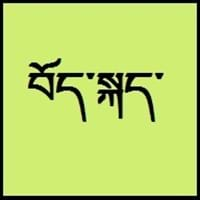Countries
Autonomous Republic of Abkhazia, Georgia, Republic of Abkhazia
China, Nepal
National Language
Abkhazia
Nepal, Tibet
Second Language
Not spoken in any of the countries
Not spoken in any of the countries
Speaking Continents
Europe
Asia
Minority Language
Not spoken in any of the countries
China, India, Nepal
Regulated By
Not Available
Committee for the Standardisation of the Tibetan Language
Interesting Facts
- Abkhaz is a north-west Caucasian language.
- Abkhaz is spoken in Abkhazia by only 100,000 people, while in Turkey there are 500,000 people speaking Abkhaz.
- Tibetan dialects vary alot, so it's difficult for tibetans to understand each other if they are not from same area.
- Tibetan is tonal with six tones in all: short low, long low, high falling, low falling, short high, long high.
Similar To
Adyghe language, Abaza language
Not Available
Derived From
Caucasian languages
Not Available
Alphabets in
Abkhaz-Alphabets.jpg#200
Tibetan-Alphabets.jpg#200
Scripts
Cyrillic
Tibetan alphabet, Tibetan Braille
Writing Direction
Right-To-Left, Horizontal
Left-To-Right, Horizontal
Language Levels
Not Available
Hello
Бзиа збаша (Bzia zbaşa)
བཀྲ་ཤིས་བདེ་ལེགས། (tashi delek)
Thank You
Иҭабуп (It̢abup)
ཐུགས་རྗེ་ཆེ་། (tujay-chay)
How Are You?
Ушҧаҟоу? (Ušṗaꝁou?)
ཁྱེད་རང་སྐུ་གཇུགས་བདེ་པོ་ཡིན་པས།
(kayrang kusu debo yimbay?)
Good Night
Ашара шәзыбзиарахааит (Ašara šəzybziaraxaait)
གཟིམ་ལཇག་གནང་དགོས་། (sim-jah nahng-go)
Good Evening
Уа, мшы бзиа (Ua, mšy bzia)
དགོང་དྲོ་བདེ་ལེགས།
Good Afternoon
Уа, мшы бзиа (Ua, mšy bzia)
ཉིན་གུང་བདེ་ལེགས།
Good Morning
Уа, Шьыжьы бзиа (Ua, Š’yž’y bzia)
སྔ་དྲོ་བདེ་ལེགས། (nga-to delek)
Please
Not Available
thu-je zig / ku-chee.
Sorry
Not Available
ཀོང་དགས་། (gawn-da)
Bye
Абзиараз (Abziaraz)
ག་ལེར་ཕེབས་། (kha-leh phe)
I Love You
Not available
ང་ཁྱེད་རང་ལ་དགའ་པོ་ཡོད་ (nga kayrâng-la gawpo yö)
Excuse Me
Not available
དགོངས་དག བཟོད་དུ་གསོལ། ཐུགས་རྗེ་གཟིགས།
Dialect 1
Bzyb
Central Tibetan
Where They Speak
Abkhazia
China, India, Nepal
How Many People Speak
Not Available
Dialect 2
Abzhywa
Khams Tibetan
Where They Speak
Caucasus
Bhutan, China
How Many People Speak
Not Available
Dialect 3
Sadz
Amdo Tibetan
Where They Speak
Turkey
China
How Many People Speak
Not Available
Speaking Population
Not Available
Not Available
Native Name
аҧсуа бызшәа (aṗsua byzš˚a)
བོད་སྐད་ (pö-gay)
Alternative Names
Abxazo, Abkhazian
Bhotia, Dbus, Dbusgtsang, Phoke, Tibetan, U, Wei, Weizang, Zang
French Name
abkhaze
tibétain
German Name
Abchasisch
Tibetisch
Pronunciation
Not Available
Not Available
Ethnicity
Abkhaz people
tibetan people
Language Family
Northwest Caucasian
Sino-Tibetan Family
Subgroup
Not Available
Tibeto-Burman
Branch
Not Available
Not Available
Early Forms
No early forms
Old Tibetan, Classical Tibetan
Standard Forms
Abkhaz
Standard Tibetan
Signed Forms
Not Available
Tibetan Sign Language
Scope
Individual
Not Available
ISO 639 6
abks
Not Available
Glottocode
abkh1244
tibe1272
Linguasphere
No data Available
No data Available
Language Type
Historical
Not Available
Language Linguistic Typology
Subject-Object-Verb
Not Available
Language Morphological Typology
Agglutinative
Not Available
All Abkhaz and Tibetan Dialects
Most languages have dialects where each dialect differ from other dialect with respect to grammar and vocabulary. Here you will get to know all Abkhaz and Tibetan dialects. Various dialects of Abkhaz and Tibetan language differ in their pronunciations and words. Dialects of Abkhaz are spoken in different Abkhaz Speaking Countries whereas Tibetan Dialects are spoken in different Tibetan speaking countries. Also the number of people speaking Abkhaz vs Tibetan Dialects varies from few thousands to many millions. Some of the Abkhaz dialects include: Bzyb, Abzhywa. Tibetan dialects include: Central Tibetan , Khams Tibetan. Also learn about dialects in South American Languages and North American Languages.
Abkhaz and Tibetan Speaking population
Abkhaz and Tibetan speaking population is one of the factors based on which Abkhaz and Tibetan languages can be compared. The total count of Abkhaz and Tibetan Speaking population in percentage is also given. The percentage of people speaking Abkhaz language is Not Available whereas the percentage of people speaking Tibetan language is Not Available. When we compare the speaking population of any two languages we get to know which of two languages is more popular. Find more details about how many people speak Abkhaz and Tibetan on Abkhaz vs Tibetan where you will get native speakers, speaking population in percentage and native names.
Abkhaz and Tibetan Language Codes
Abkhaz and Tibetan language codes are used in those applications where using language names are tedious. Abkhaz and Tibetan Language Codes include all the international language codes, glottocodes and linguasphere.





